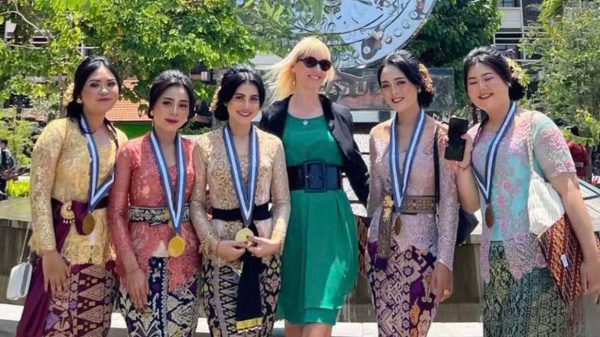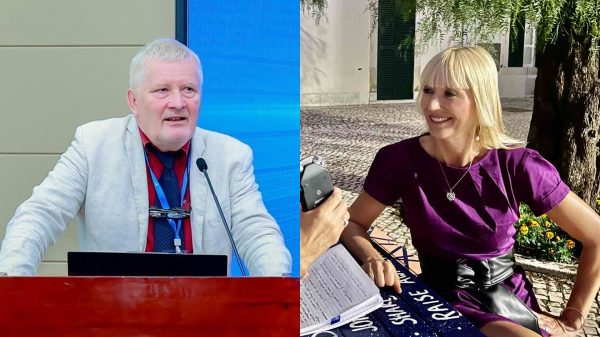
27.03.18
Multilingual lives
By Thomas H Bak
When I found out by chance, just a few weeks ago, that the date mentioned on the famous Rosetta stone, arguably the most famous and iconic multilingual document in the history of mankind, is the same as my birthday, 27th of March, I could not help feeling that this must be the hand of destiny (or, as my Indian friends would say, karma). The topic of language and languages appears as a constant theme in my life, from my parents, speakers of Polish and German, to my daughter growing up surrounded by three languages (English, Spanish and Polish). It permeates my work on aphasia, dementia and, more recently, bilingualism and cognition, as well as my personal life (as I like to say, my worst addiction is learning new languages; at the moment I am having a go at Swahili, which I absolutely love). Even now, writing this, I am sitting in the James Gillespie School in Edinburgh, where my daughter goes to Saturday Spanish classes.
But a true story is rarely straightforward. Yes, my parents were native speakers of different languages, Polish and German, but I did not grow up bilingually. In the 1960’s, the general attitude towards bilingualism across much of the world was rather hostile. A common fear, even among educated and otherwise well-informed people (my mother was a paediatrician, my father a GP) was that children growing up with two languages end up confused, even schizophrenic. Today, this may sound backward, almost ridiculous, but I fear similar arguments are still being made, at least in the UK. I know of an Italian mother who has been told that her son developed schizophrenia because she was speaking to him in Italian, not in English. In 2002, David Blankett, at that time British Home Secretary, criticised the use of South Asian languages at home as contributing to intergenerational “schizophrenia”.
My parents’ decision to speak only Polish and not German with me was based on “cognitive” rather than political or social considerations. In Cracow, where I was growing up, German language was associated not just with the dark but short period of Nazi occupation but with the long history of being part of the extremely multilingual Austro-Hungarian empire, with German as the lingua franca. My paternal grandfather was born in Chernivtsi, Bukowina, where, I was told, it would have been impossible to walk down a street without hearing at least 5 different languages. He studied in Vienna, spent some time in Italy and was apparently fluent in 7 languages (unfortunately I never had a chance to meet him, since he fell victim to the Stalinist persecutions after the Second World War). My father, native Polish speaker born in Lwow (now Lviv, Ukraine) spoke fluent German. Just a short list of names of my paternal relatives shows the linguistic diversity of the world they were living in: Horodyski, Vanjek, Belohradsky, Florer, Lupan.
The linguistic situation in Upper Silesia, where my mother came from, was radically different. The population was ethnically and linguistically mixed, but language was often used as a political weapon, splitting towns as much as individual families. My mother told me that the slogan written in large letters above the entrance to her school in Hindenburg (now Zabrze) during the Nazi time was “Wer Polnish spricht ist unser Feind” (whoever speaks Polish is our enemy). Unsurprisingly, after 1945, when most of Silesia became part of Poland, the use of German became taboo. I can remember that after the death of my grandmother (I must have been around 7-8 years old at that time) the family was discussing in which language they should write the inscription of the tomb stone as not to upset anybody. In a Catholic country, Latin was often the safest bid (“requiescat in pace”). Interestingly, Latin had also another political connotation: for many years, the communist government considered it as reactionary; when I was a pupil they were just cautiously reintroducing it as a voluntary subject. Of course we all went enthusiastically to the Latin classes: it was yet another opportunity to protest against the socialist system.
Modern languages had political connotations too. Russian was obviously the language of the Soviet Empire, underlined by lessons such as “The youth of Lenin” or “The harvest in the agricultural co-operative”, not exactly the topics to excite a teenager. Fortunately, we had good Russian teachers, who managed to do as little as possible of the official party-line stuff and instead immersed us in Russian literature, particularly poetry: undoubtedly, one of the greatest on earth. The negative attitude to Russian was also countered through enormous popularity of Russian singer-songmakers such as Bulat Okudzhawa and Vladimir Vysotsky. English was of course the other end of the spectrum, the adored language of the West and the Free World. We were learning how to book a flight from London to New York at a moment when we could hardly imagine ever to be able to do it in real life. French was already on the retreat in comparison with English, although I always admired the elegance of its sounds and ideas. German had a strange dual position: it was at the same time the language of West and East Germany, the first one as close to paradise, the second to hell as one could imagine.
With 17 years, I moved to (West) Germany, starting a new chapter in my life. German was not unfamiliar to me; although my parents did not speak it with me, they often spoke it to each other when they did not want me to understand their conversation (a powerful motivation for a child to actually try to learn a language). Also, my mother, who loved singing, sang to me dozens of German Lieder and operatic arias. So I picked up German very fast, completing my Abitur (A-level) in Stuttgart, studying medicine in Homburg/Saar, Bochum, Essen and Hamburg, doing my doctorate on aphasia (language disorders caused by brain diseases) in Freiburg im Breisgau and then working in psychiatry in Basel and Berne in Switzerland (the latter required me also to learn Swiss-German, practically unintelligible for “High German” speakers). I soon felt at home in German and even now, having lived for over 20 years in the UK, if I struggle to find a specific word, it often comes to me first in German, despite the fact that my foreign accent identifies me to native speakers as a stranger.
One of the greatest blessings of the life in the West was the ease of travelling. This meant exploring first the neighbouring, then more distant countries and trying to learn their languages: French, Dutch, Italian, Spanish, Norwegian. And of course English: I did a summer course in Cambridge and then medical English course in Edinburgh: exactly the places to which I was to return later in my life. Having said that, English was definitely not my strength: my teacher in Stuttgart told me “Bak, whatever you do in life, try to find something where you don’t need English”. I am glad I didn’t follow her advice.
With time, the radius of my linguistic activities got bigger: I went on student exchange to Turkey and Japan, attempting to learn both languages, although Turkish was by far the more successful one, leaving me with a life-long affinity to morphologically complex agglutinating languages, such as Hungarian, Finnish or Mongolian. The move from Berlin to Cambridge in 1996 made this radius even wider. Cambridge was not only a perfect place to learn languages (I attended Sanskrit, Arabic, Chinese and Basque classes, as well as legendary seminars on Hafez translations by the late Prof. Peter Avery), but also to meet people from all over the world speaking them. And I kept in touch with many of them when they went back to their countries. In 2000 I first visited Brasil, in 2001 Argentina and Chile. When I went there again a few years later I was giving my talks not in English any more but in Portuguese and Spanish. In December 2000, I went for the first time to India and the fascination for this country, its culture and history, but also its languages and scripts, has never left me since. Few years later it became also a topic of my research, in collaboration with my friend and colleague Suvarna Alladi, whom I also met at Cambridge.
In 2001, Gyorgy Gomori, professor of Polish at the University retired and his position was not replaced. As the president of the Cambridge University Central European Society (CES), I was campaigning with friends and colleagues to re-establish Polish studies and re-vitalise interest in Central European cultures and languages; part of it was organising language classes in Polish, Czech and Hungarian (needless to say, I attended the latter two). But the most delightful way to enjoy the linguistic diversity of Cambridge was through the meetings of the international poetry club, which I founded together with a group of friends. We met roughly once a month, often in my house in Cavendish Road, with food, drink and poetry in dozens of different languages as well as in English translation. If there is one thing I really miss in my life ever since it is this kind of meeting: I have never managed to establish something similar anywhere else.
As mentioned before, language was for me not only a passion but also a topic of much of my professional work. My doctorate in Freiburg was on acute aphasia. In Cambridge I was exploring embodied cognition and the relationship between language and motor functions (particularly dissociations between noun and verb processing) in neurodegenerative diseases such as dementia. To get some theoretical foundation in linguistics, I attended lectures and summer schools and have learned a lot through conversations with my linguist friends, particularly Martin Haspelmath and Nick Evans. However, it was only after my move to Edinburgh in 2006 that multilingualism and language learning became the focus of my research. Edinburgh offered a thriving community of bilingualism researchers, including Antonella Sorace and Bilingualism Matters network, of which I am now co-director. Moreover, the seminal paper by Ellen Bialystok and colleagues in 2007, describing a 4 years delay in onset of dementia in bilinguals when compared to monolinguals, meant that the topic became highly relevant not only to linguistics and psychology, but also medicine and public health. Here was a fascinating new field, raising many unanswered questions, from biology and pathology to cultures and societies. It opened new collaborations, be it in the AHRC project “Multilingualism: empowering individuals, transforming societies” (MEITS), where I am the Strand Leader on “Multilingualism, cognition, health and well-being”, be it working together with Dina Mehemedbegovic, with whom I am jointly promoting our idea of a “healthy linguistic diet”. It also appealed to my idea of the world as a natural laboratory, and soon I was studying diverse populations, from elderly Gaelic-English bilinguals in the Outer Hebrides, through Gaelic learners of all ages in Sabhal Mor Ostaig on the Isle of Skye and the Lothian Birth Cohort in Edinburgh, to young and old people in highly multilingual countries like Malta, India and Singapore. And I am trying to translate our findings into practical action, in collaboration with an innovative Scottish social enterprise Lingo Flamingo, offering language classes to older people and even to patients with dementia.
While my work remains focused on older adults, I got also a first hand experience of multilingual language development in children through my daughter Alba, born 2012 in Barcelona. Her first words were in Polish (“książka” for book, “buciki” for shoes, “kaczka” for duck), followed by Spanish (her mother’s tongue). But as she started attending a nursery and later school, English became clearly her dominant language, followed by Spanish (reinforced through interaction with Spanish-speaking friends and family and holidays in Spain). What I find particularly fascinating is the way in which being exposed to different languages makes her aware of linguistic phenomena (“metalinguistic skills’). One day, when she was just a little more than 3 years old, she asked me how to say “envelope” in Spanish and Polish. I said, “sobre” in Spanish and “koperta” in Polish. But “koperta” sounds more Spanish, she replied surprised. And she was right: the Polish term is a loanword from Italian, a language phonologically much closer to Spanish than to Polish.
By now, it would be entirely impossible for me to imagine a life in one language only. I use English, Spanish, Polish and German regularly, give talks in 7 languages, read in more than 10. And I can’t help to wish to learn more, although my tight work schedule does not leave much time for it. I was delighted to have met hundreds of kindred spirits at the Annual Polyglot Conference in Reykjavik in October 2017 and hope to continue going to their meetings in future. And I hope that my work will shed some light into the fascinating world of multilingualism and language learning and help to correct so many prejudices still existing around it.
Further links
A very good insight into my work and my way of thinking about multilingualism and language learning is provided in the BBC Scotland Brainwaves interview with Penny Latin:
http://www.bbc.co.uk/programmes/b09pz108
and a two-part BBC World Service Discovery programme with Gaia Vince:
http://www.bbc.co.uk/programmes/p03stqfh
http://www.bbc.co.uk/programmes/p03tknz9
Two recent papers summarising my research, its background and implications, for non-specialist audience are:
http://www.meits.org/policy-papers/paper/healthy-linguistic-diet
and
https://online.liverpooluniversitypress.co.uk/doi/abs/10.3828/ejlp.2017.10

